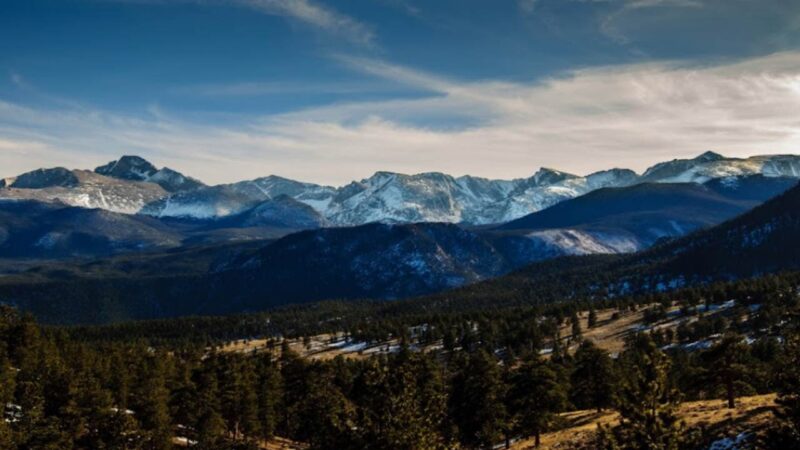The state of Colorado is home to a diverse selection of well-known mountains and unusual mountain ranges. These popular mountains are visible across the whole state, from mountain villages that provide convenient access to ski resorts to the historic main street of a town that has been abandoned.
It is highly recommended that you pay these mountains a visit, and if you like that sort of thing, you could even consider hiking or climbing there.
So, here is a list of the top major mountains in Colorado.
1. Pikes Peak
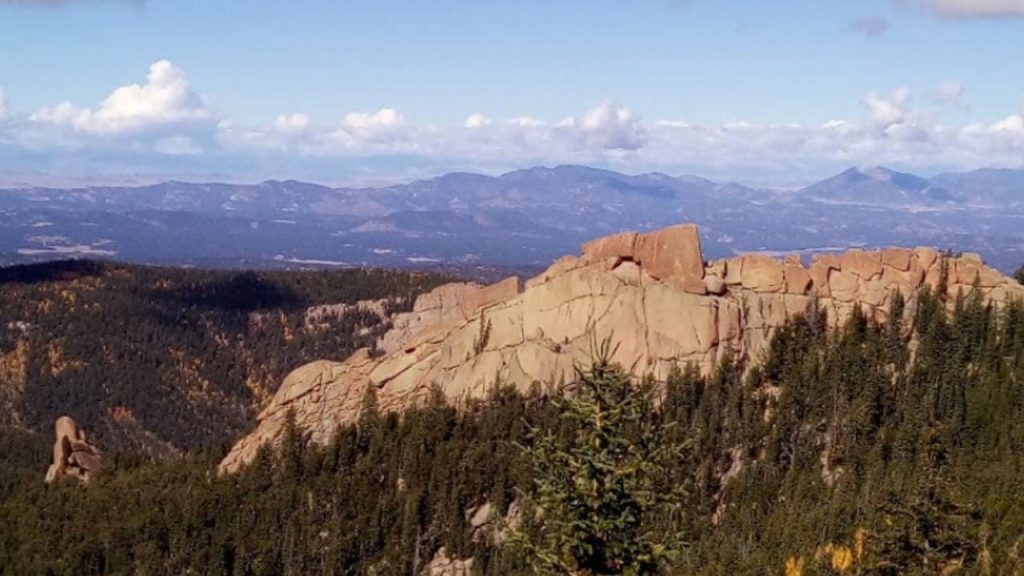
Pikes Peak is undoubtedly one of the most well – known and well – recognized names on our list. It is often referred to as US’s Mountain due to the fact that it served as the inspiration for the national song, “US the Beautiful.” Because of its elevation of 14,115 feet above mean sea level, Pikes Peak is referred to as a “fourteener.”
Pikes Peak gets its name from Zebulon Pike, the pioneering explorer who made the first recorded ascent of the mountain. Also, Pikes Peak is easily seen from Colorado Springs, Manitou Springs, and Woodland Park because of its proximity to Highway 24, which is located just west of the city of Colorado Springs.
Additionally, it is one of three summits that can be seen from Denver, the other two being Longs Peak and Mount Evans. The summit is reachable by automobile, but along a route that is extremely twisty and congested. Because there is a shortage of parking at the summit during the busier summer months, it is possible that you may be compelled to make use of the complimentary shuttle service.
You might also choose to trek or bike your way up and down the many mountain routes. Moreover, you have the opportunity to compete in the Pikes Peak Hill Climb, popularly referred to as the “Race to the Clouds,” every year throughout the summer. Since 1916, participants in this event have driven cars and ridden motorcycles in an attempt to reach the finish line first.
2. The Maroon Bells
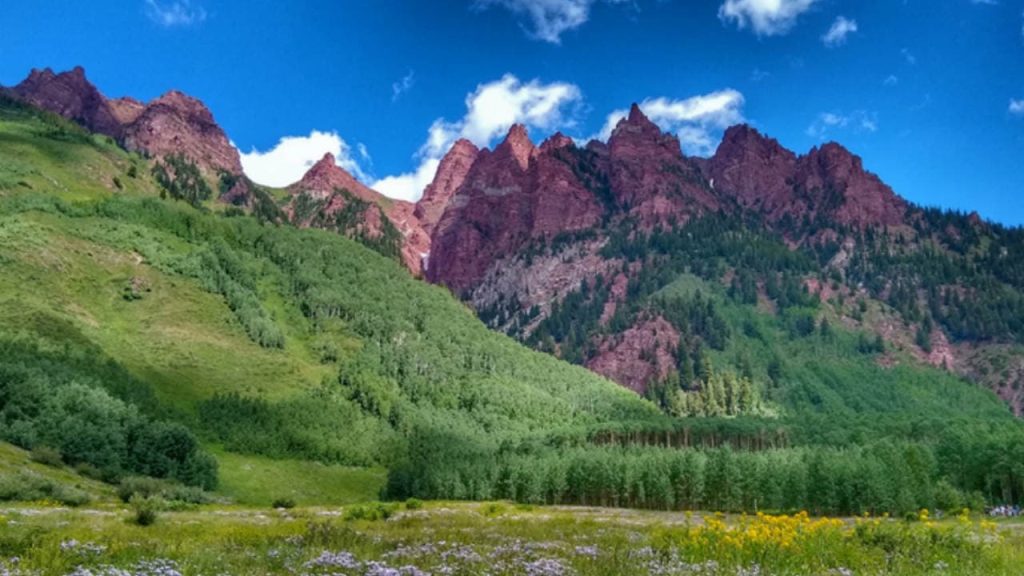
Maroon Bells are the peaks in the Rocky Mountains that have been photographed the most. Have you ever seen a photo that’s just a general representation of the mountains in Colorado? It is most likely that this picture was taken at Maroon Bells.
The Maroon Valley is home to two peaks that are related to one another, called Maroon Peak and North Maroon Peak. They were given such a name due to the fact that they are reddish and have the form of a bell. Both summits are fourteeners, which means they are higher than 14,000 feet.
Additionally, the Maroon Bells may be seen in the White River National Forest, approximately 12 miles away from the city of Aspen, Colorado. It is possible to reach these two mountains by driving, riding the bus, or using the shuttle service, and then trekking a short distance into the Maroon Valley.
3. Crested Butte Mountain
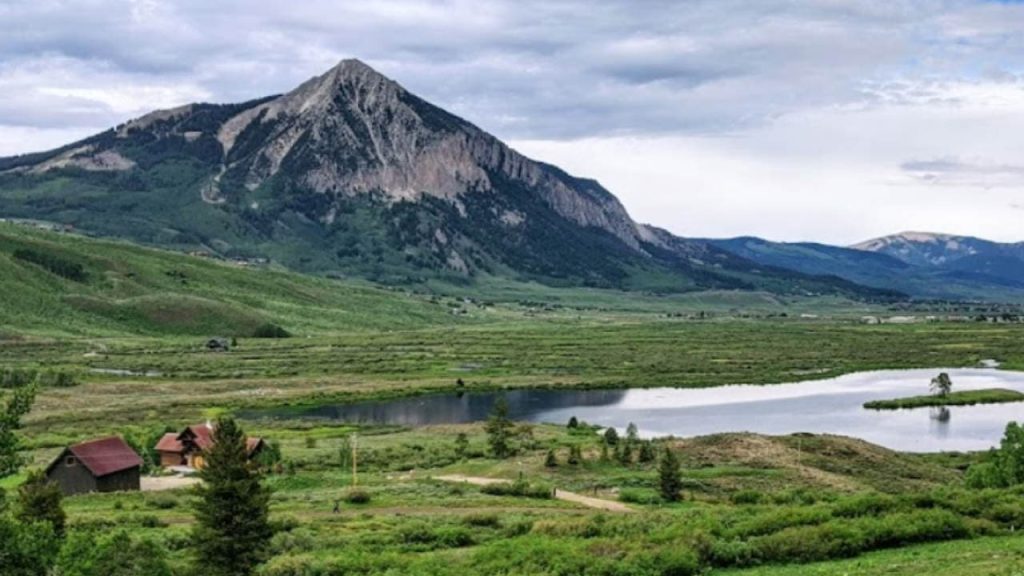
It is a mountain in Colorado that is 12,162 feet tall and is most famous for its extremely pointed appearance. Just to the north of Gunnison National Forest, the destination may be found in the well-known alpine town of Crested Butte. In addition, Crested Butte is connected to the Crested Butte Mountain Resort, which is a terrific spot to go skiing in the winter; but it also has a variety of activities available throughout the summer.
Because of its more remote position, Crested Butte is home to a variety of animal species. I highly recommend that you check out the wildflower festival in the summer, and go skiing in the mountains during the winter months.
You might also enjoy visiting these lakes in Colorado.
4. Longs Peak
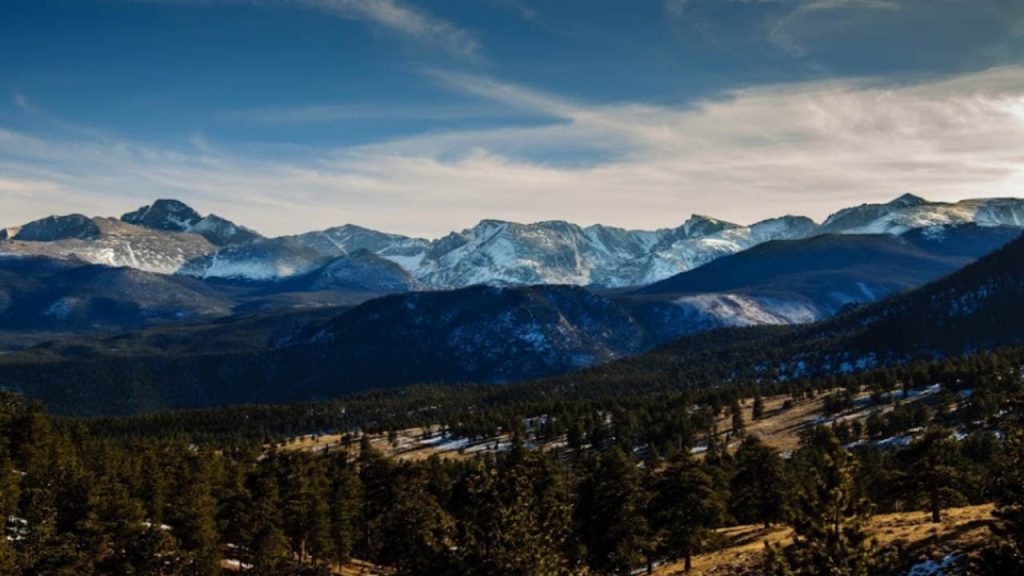
Longs Peak, located in Colorado, is another one of the state’s well-known fourteeners. Its elevation is 14,259 feet. It is also the lone fourteeners in Rocky Mountain National Park and is recognized for being the highest peak in Boulder County.
Longs Peak may be found about 15 kilometers southwest of Loveland, Colorado, and about 9 kilometers south of Estes Park. It is one of the three fourteeners that may be seen from a variety of sites throughout the Front Range, as was previously described.
Even for seasoned mountaineers, the ascent up the summit via the Keyhole Route is a treacherous and time-consuming 14.5-mile round-trip journey that is fraught with danger. Try out the 2.8-mile Mills Lake path if you’re looking for a trek that’s a little easier on the legs but still offers spectacular views of Longs Peak from a variety of vantage points.
5. Mount Evans
With an elevation of 14,271 feet, Mount Evans, comes in at number five on our list of notable mountains in the state. Also, the Mount Evans Scenic Byway holds the title of being the paved road that is located at the highest elevation in the United States.
To get to the summit of Mount Evans, you need to keep going up Mt. Evans Road past Echo Lake. Due to its proximity to the Denver metropolitan area, Mount Evans serves as a popular destination for day trips and hiking excursions. Moreover, there is a chance that you will come across white-tailed deer, black bears, mountain lions, and bighorn sheep.
6. Mount Elbert
Mount Elbert, with an elevation of 14,440 feet, is the highest peak in the state of Colorado. Additionally, it is ranked among the top twenty tallest summits in the lower 48 states of the United States. In comparison to the other mountains on this list, Mount Elbert is referred to as the “gentle giant” due to the fact that many of the climbing routes are far less strenuous.
Besides, the train trip over the mountains on the Leadville Colorado & Southern Railroad takes about two and a half hours and is one of the most relaxing ways to see the peak.
Make sure to also check out these beautiful places in Colorado.
7. The San Juan Mountains
There is no mountain range in the state of Colorado that is larger than the San Juan Mountains. They are visible while traveling through the southwest part of Colorado across the Front Range in either direction. On a really clear day, it is even possible to view them from Colorado Springs.
Cities such as Durango and Silverton can be found connected by the San Juan Mountain range. It is a section of the San Juan Skyway Scenic Byway, which is located in the southwestern region of the state and has a total length of 233 miles. When mountain biking, trekking, or climbing one of the San Juan Mountains’ summits, you should be prepared for their extremely steep terrain.
8. The Spanish Peaks
A pair of mountains known as the Spanish Peaks may be found in the southwestern part of Colorado. The term “breast shaped hills” or “breasts of the earth” is frequently used to refer to these hills. The mountain known as West Spanish Peak, which stands at a height of 13,626 feet, and its taller sibling, East Spanish Peak, is located in proximity to it and stands at a height of 12,683 feet.
The Hogback Nature Trail at Lathrop State Park, which is an easy two-mile trek, and the La Veta Loop Trail, which is an easy-to-moderate three-mile hike, are two of the most popular routes with views of the Spanish Peaks. Both hikes are rated as easy to moderate.
9. Continental Divide
The Continental Divide, sometimes referred to as the Great Divide, is the primary physical feature that divides the Pacific Ocean and the Atlantic Ocean from one another. It begins in Canada and continues all the way south to the Gulf of Mexico and much farther.
In the states of Colorado and New Mexico, a sizeable portion of the Pacific Coast is composed of the Rocky Mountain Range. Over 3,100 miles of hiking, backpacking, and camping await you along the Continental Divide Scenic Trail.
10. Sangre de Cristo Mountains
The Sangre de Cristo Mountains are the final entry on my list; they are the most southern region of the Rocky Mountains and feature numerous peaks that are above 14,000 feet in elevation. The moniker “blood of Christ” comes from the Spanish phrase “Sangre de Cristo,” and the mountains got their name from the brilliant crimson color that can be seen between dawn and sunset.
One of the world’s longest mountain ranges, these mountains span for 225 miles from Salida, Colorado to Santa Fe, New Mexico, making them one of the longest mountain ranges in the world.
11. Mount Harvard
The Rocky Mountains of North America’s third-highest peak, Mount Harvard, are located in the U.S. state of Colorado. The towering 14,421-foot fourteener is the fourth-highest peak in the contiguous United States and the highest summit of the Collegiate Peaks.
12. Mount Lincoln
The Rocky Mountains of North America’s eighth-highest peak, Mount Lincoln, are located in the U.S. state of Colorado. The towering 14,293-foot fourteener, which is well-known, is the eleventh-highest peak in the contiguous United States and the highest summit in the Mosquito Range.
13. Blanca Peak
The Rocky Mountains of North America’s fourth-highest peak, Blanca Peak, are located in Colorado, a state in the United States. The tallest peak in the Sangre de Cristo Mountains, Sangre de Cristo Range, and Sierra Blanca Massif is the notable 14,351-foot peak.
These are essentially the most important mountains in Colorado that offer unique landscapes, beautiful nature and also wildlife. Make sure to include them in your bucket list!

